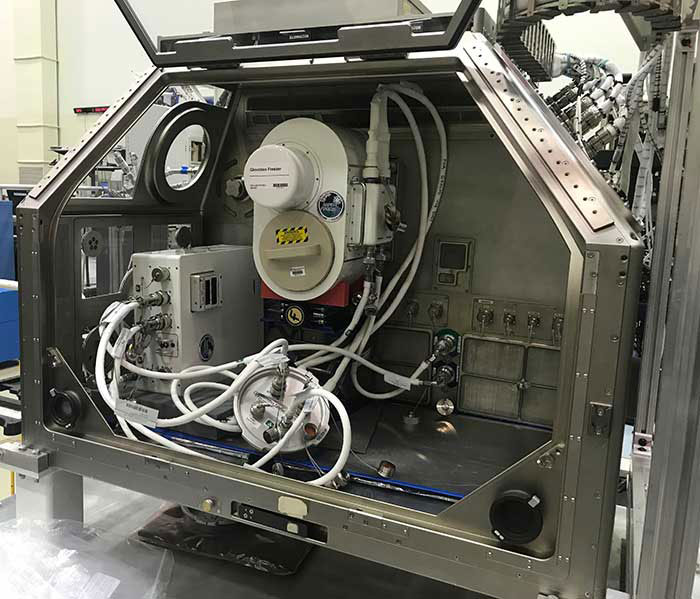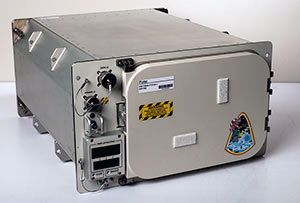 A multi-year contract between NASA and the UAB Engineering Innovation and Technology Development (EITD) research group was recently doubled, giving the group a $50-million cap on work to provide and maintain cold-stowage units for the International Space Station (ISS).
A multi-year contract between NASA and the UAB Engineering Innovation and Technology Development (EITD) research group was recently doubled, giving the group a $50-million cap on work to provide and maintain cold-stowage units for the International Space Station (ISS).
EITD, a research group of nearly 40 engineers and technicians led by School of Engineering professor Lee Moradi, Ph.D., has played a key role in NASA ISS research for more than a decade. The group has designed and built a series of freezers capable of maintaining temperatures as low as negative 160 degrees Celsius. Each line of freezers meets specific cold-stowage demands, from storing scientific samples to serving as galley refrigerator/freezers for the ISS crew.
During their use on the ISS, the individual units are monitored by EITD personnel from their Remote Operations Command Center (ROCC) on the UAB campus.
 EITD's Rapid-Freeze device integrated in the NASA Life Sciences Glovebox. Learn more about the Glovebox.While no specific reason was provided for the increased contract amount, the announcement comes at a time when EITD is expanding its involvement with NASA projects. In recent months, the group received a five-year contract with the Center for the Advancement of Science in Space (CASIS), and a $3.6-million project to develop two different rapid-freeze technologies for use on the ISS. The first rapid-freeze technology is near completion and is expected to be launched later this year. In 2017, EITD received a contract worth $6.2 million to design and build a new set of negative 80-degree Celsius freezers to support the increased needs for cold stowage on the ISS.
EITD's Rapid-Freeze device integrated in the NASA Life Sciences Glovebox. Learn more about the Glovebox.While no specific reason was provided for the increased contract amount, the announcement comes at a time when EITD is expanding its involvement with NASA projects. In recent months, the group received a five-year contract with the Center for the Advancement of Science in Space (CASIS), and a $3.6-million project to develop two different rapid-freeze technologies for use on the ISS. The first rapid-freeze technology is near completion and is expected to be launched later this year. In 2017, EITD received a contract worth $6.2 million to design and build a new set of negative 80-degree Celsius freezers to support the increased needs for cold stowage on the ISS.
“These contracts are evidence of the quality of personnel we have in our group,” says Moradi. “Our engineers and technicians have an impeccable reputation that has been built over decades, and we have been able to recruit extremely talented young engineers and software developers, including several top UAB students, both graduate and undergraduate.”
EITD Cold Stowage Products
EITD is one of the nation's leading developers in cold stowage hardware for use in microgravity and exploration. Current cold stowage projects include the following items. Click on any image for additional information about the product.
 MERLIN
MERLIN
Microgravity Experiment Research Locker Incubator
Built at UAB since the early 2000s, MERLIN units provide thermal control from negative 20 degrees to 48.5 degrees Celsius. They are used as incubators for scientific experiments as well as to support crew galley operations.
 GLACIER
GLACIER
General Laboratory Active Cryogenic ISS Experiment Refrigerator
A cryogenic freezer/ refrigerator system that provides a generic interface to accommodate multiple biological sample types and volumes that require thermal control between negative 160 degrees and plus 4 degrees Celsius while on the International Space Station (ISS).
 Polar
Polar
The most recent of the cold stowage units designed by EITD, Polar is capable of maintaining temperatures as low as negative 80 degrees Celsius.
 Iceberg (In development)
Iceberg (In development)
In 2017, EITD received a contract worth $6.2 million to design and build a new set of negative 80-degree Celsius freezers to support the increased need for cold stowage on the ISS.